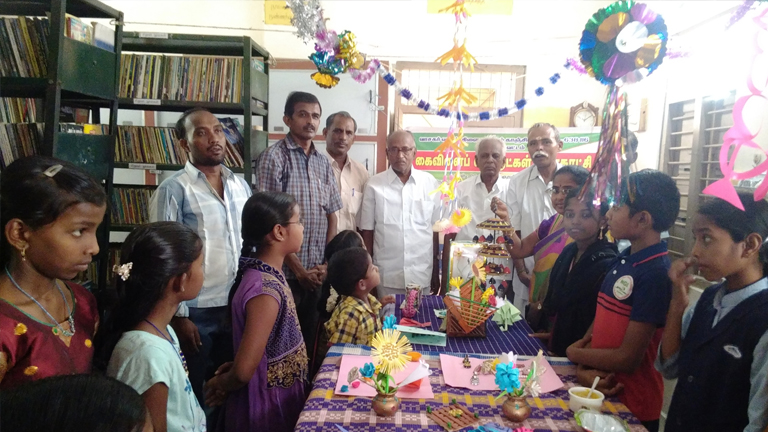Lifelong Knowledge Learning Centres in Kanjikovil Panchayat discovers potential NASA’s young scientist

The INELI (International Network of Emerging Library Innovators) and Indian Public Library Movement (IPLM)’s library programme at M S Swaminathan Research Foundation is charting the course for public librarians as community trailblazers, who are repositioning their respective public libraries as lifelong knowledge learning centres. Since August 2015, it has spearheaded more than 61 community trailblazer’s from 22 states in India engaged in supporting sustainable development, by providing access to relevant information through innovative services for diverse groups including marginalised communities. The branch Library of Kanjikovil Panchayat, a town in Erode District in the State of Tamil Nadu provides innovative services based on community needs and has engaged in raising awareness on environmental, social and development issues. In the recent past, the trailblazer of Kanjikovil Panchayat, Mrs Kalaiselvi took initiative to address the issue of waste and its impact over environmental protection, conservation and ethical use of natural resources.
In 2017, the students nudged the trailblazer for information on science based experiments using waste materials, which is not provided in their schools. The trailblazer recalled about the STEAM and STEM programmes in her public library that provided hands on experiences for children of different age group. Further, with an online research using search engine tools, she gathered relevant information on environmental pollution and recycling of waste materials, based on which she designed a continuous, weekly programme for these students.
The keen learners were so motivated and the students as well as the library users began to innovate electric working models of vacuum cleaners, popcorn maker, making of tar for road, refrigerator, water purifier, making pen holders, greeting cards, dolls, table coasters and many more using recycled paper, thermocol, and plastic. These materials were collected by the students from the local households. Now library users have become guides for students to help on identifying materials and models for demonstration.
This initiative began with just 13 students and has now nurtured more than 50 students from the age group of 6 to 15. More than 316 products were developed, an exhibition was organised in which 37 students were recognised for innovative and creative thinking, in that 3 of the students became winners at the district level competitions organised by local schools and colleges. Mr Kishore from government higher secondary school, 14 years old who is a regular library user for more than five years has acquired skills and knowledge from the trailblazer and developed innovative products (popcorn maker, refrigerator and working robot) through recycled materials. Subsequently, he won the young scientist Inspire State Award for innovation in science and research presented by MANAK in January 2019 and was selected to represent at the National Level. He was also nominated to participate as youngest scientist for the NASA training programme in Sriharikota.
The Kanjikovil Branch Library and its trailblazer have become inspirants to foster play, innovation, exploration and participatory learning for various target groups. Mrs. Kalaiselvi expressed that it is important to understand community needs, ideate and facilitate learning to bring change through local libraries. Presently, the community members communicate with Mrs. Kalaiselvi requesting for other types of services to support men, women, senior citizens, farmers, etc. Mrs. Kalaiselvi has successfully demonstrated public library as a knowledge learning centre, for which the local community has recognised her as the Best Librarian and awarded ‘The Best Librarian Award’ in 2018. This library also targets to achieve UN SDG goal No: 4 – Quality Education, goal No: 13 Climate Action and 12 – Responsible Consumption and Production.
This demonstrates that libraries can support a range of activities, facilitate formal and informal learning opportunities, build connections between schools, homes, library and community, and encourage collaborative learning for improving skills and knowledge of the local communities.
Author: M Kalaiselvi, Co-Authors: Priyanka Mohan and Siranjothi K, Edited by: Christy Leema E

